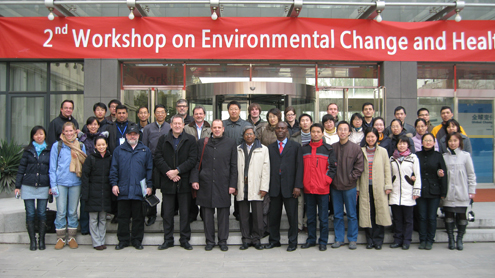Workshop and Students Training Course on Global Environmental Change and Health Held in Beijing
The International Workshop on Global Environmental Change and Health in Beijing-Tianjin Urban Area – Vulnerability and Vulnerable Groups was held on 17 to 18 November 2009 in the Institute of Geographic Sciences and Natural Resources Research (IGSNRR), Chinese Academy of Sciences (CAS), Beijing, China. More than 50 domestic and foreign scholars participated.
The opening session was chaired by Prof. Wang Wuyi from IGSNRR and Dr. Thomas Kraft from Geomed Research Forschungsgesellschaft mbH. Welcome address was convened by Prof. Ge Quansheng, the deputy director of IGSNRR and Sectary General of China National Commission of the International Human Dimensions Program on Global Change. The CAS academician Prof. Qin Dahe, and Prof. Mark Rosenberg, Queen's University Canada delivered keynote speech respectively.
In respects of global environmental change, urbanization and health risks, urban environmental change and health indicators system, the health risks of early warning systems, health protection of vulnerable groups (e.g. elderly), environmental risk awareness, poverty, etc., participants submitted many special reports, and conducted useful discussion and put forward lots of constructive comments.
The Capacity Building and Training Course that organized by Global Change and Health Advisory Group of International Human Dimensions Programme on Global Environmental Change, in collaboration with ESSP joint Project on Global Change and Human Health and the IGU Commission on Health and the Environment, and IGSNRR was continued from19 to 22 November 2009.
Thirty international students and students of IGSNRR participated the training course which consisted of poster session, lecture session, reading session, group discussion, presentation session and field trip. Through the training sessions, not only did participants more in-depth understanding of global environmental change and health research theories and methods, they also improve the capability and skill on reading in academic paper, writing in project proposal, addressing in academic paper and other relevant activities. In the various training sessions, domestic and foreign participants all agreed that their abilities including communication between different countries and cultural, participating in international projects, and better understanding have been effectively improved. Most of domestic students have greatly improved their English language ability and self-confidence, which shown that training course is a very useful practical activity.
Next year, workshop and training course on global environmental change, urbanization and health will continue to be held in Institute of Geographic Sciences and Natural Resources Research, Chinese Academy of Sciences.

From Department of Environment Geography and Human Health
Download attachments: